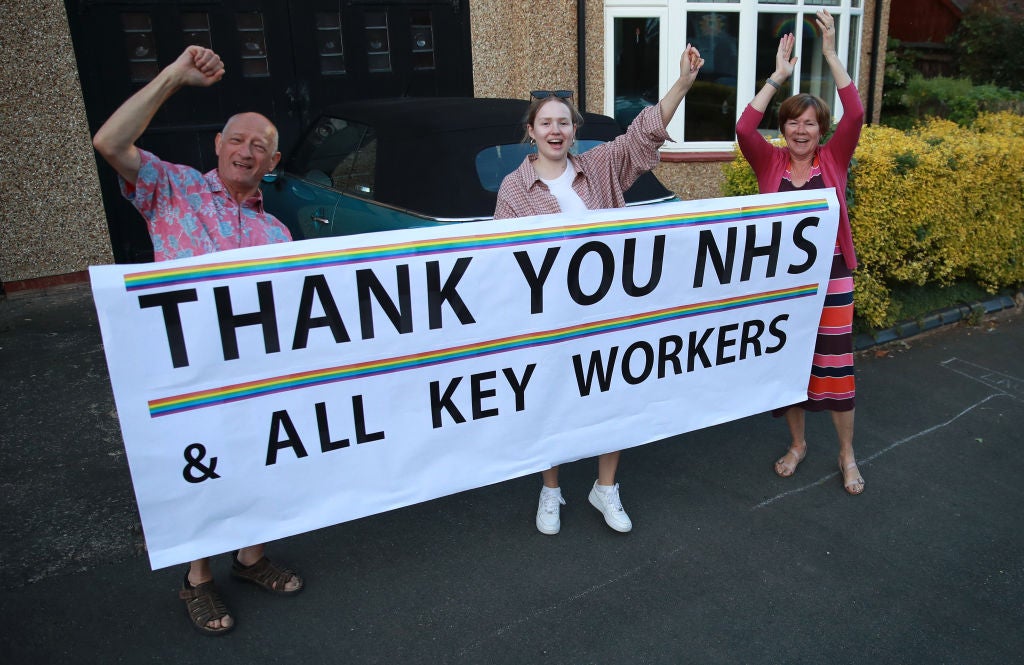Frontline workers have put their mental health at risk this year – it is time for us to help
As healthcare workers form our frontline against coronavirus, they have even more pressure placed on them – and have been shouldering this additional weight without any respite since March

Coronavirus has impacted everyone’s lives but its effects, particularly on our mental health, vary for each individual.
At Samaritans, we are busy 24 hours a day, 365 days a year and this hasn’t changed in 2020. The pandemic and subsequent lockdown restrictions have created a challenging and uncertain environment – one we are all still trying to understand and manage.
Since March, our volunteers have provided emotional support to people more than 1.2 million times, through our telephone helpline, email, letters and online chat pilot. One in five of these calls for help has been about coronavirus. Many of these callers feel anxious and stressed, concerned about isolation, worried about their mental health issues, as well as their family and their finances.
As healthcare workers form our frontline against coronavirus, they have even more demands and pressure placed on them. Many of them have been shouldering this additional weight without any respite since the first Covid wave, battling regional case rises and local lockdowns over the year, including the most recent tier 4 announcement. We know that being on the frontline means you are not only putting your physical health at risk, but your mental health, too.
That’s why Samaritans launched a new confidential support line dedicated to NHS and social care workers, in partnership with NHS England and DHSC. NHS and social care staff can call for free anytime between 7am to 11pm, seven days a week, including over the festive period. All calls are answered by trained Samaritans volunteers, who will listen in confidence and without judgement.
Our volunteers are on hand to support staff when they’ve had a tough day, are feeling under pressure or have lots on their mind. Samaritans is there for everyone, not only those in crisis or feeling suicidal.
Since its launch in April, our volunteers have heard from some frontline workers who are feeling exhausted and stressed. Some have felt anxious about catching the virus and taking it home to their families. Some have felt guilty for shielding and that they were letting their colleagues down. Some have concerns about their work’s impact on their own wellbeing and on the wellbeing of their family members, affecting their relationships.
We’re seeing how certain common feelings that were raised at the beginning of the pandemic are evolving, such as some staff having feelings of burnout, as they adapt to new pressures emerging in what remains a changeable situation.
If any of this rings true for you, I hope it makes you feel less alone and encourages you to think about reaching out for support. It’s also important to remember that everyone is different and there is no uniform way to feel about what you are going through, so if you’re struggling for any other reasons, it is just as important to talk to someone.
Medical professionals and those in the position of helping others can sometimes impose an expectation that they should not need help themselves. The resilience required for your job, even at the best of times, can foster a misperception that struggling mentally is a weakness. During the pandemic, the “hero” narrative that has played out in the public around NHS workers, while absolutely right in its intention to recognise and celebrate the significant role you are playing, may inadvertently reinforce the existing misconception that you are indestructible. Health care workers are human, and challenges in life affect you just the same as everyone else.
This stigma surrounding help-seeking among health care workers must end now. Treating your mental health as you would your physical health is vital, particularly at this time. We know coronavirus is likely to have a long-term impact on mental health, so I urge you to take a look at the free mental health support out there.
As well as the bespoke support line we run for NHS and social care workers, Samaritans also launched Our Frontline with Mind, Hospice UK and Shout85258 aimed at all key workers. Through Our Frontline, this coalition of charities are working together to provide key workers with free, round-the-clock, one-to-one mental health support and extensive resources, advice and tips to take care of your mental wellbeing, all in one place.
You may wonder what the benefit of sharing how you’re feeling will be in the grand scheme of all you’re taking on each day. We’ve heard first hand that sometimes, a listening ear, some time to reflect and a chance to talk things through can make all the difference to others in your position.
Now, more than ever, it’s important that we look after ourselves and each other, so if you ever need to talk, Samaritans is here to listen.
Frontline and key workers can find out more at: samaritans.org/how-we-can-help/health-and-care/here-listen-support-line-nhs-people/
Benedict Phillips is head of service programmes at Samaritans





Join our commenting forum
Join thought-provoking conversations, follow other Independent readers and see their replies